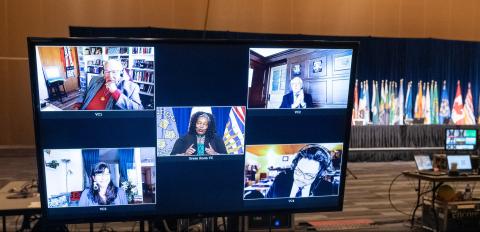The Province recently declared September 30th as Truth and Reconciliation Day to commemorate the history and ongoing trauma caused by residential schools. This article presents some considerations and resources for local governments working towards marking the day and supporting reconciliation more broadly, and incorporates guidance from panelists at UBCM’s 2021 Convention plenary.
As an initial step, UBCM encourages members to engage with neighbouring First Nations and urban Indigenous communities to discuss their plans to mark Truth and Reconciliation Day, and to gauge how best to support any events they may be planning. In walking further along the path to reconciliation, panelists from UBCM’s 2021 Convention plenary emphasized several additional considerations for local governments, captured here in two themes:
Education
In the context of reconciliation, education includes learning, but starts with the unlearning of preconceptions and inaccurate historical perspectives. The Honourable Murray Sinclair, former Chief Commissioner of the Truth and Reconciliation Commission, highlighted in particular the importance of local governments working with non-Indigenous people in their community to confront racism through education, and to provide leadership by example.
Panelists also emphasized the need to be considerate of capacity and risk for Indigenous communities when reaching out to them as part of the learning process, noting that local government elected officials and staff should first take time to review and consider seminal policy documents such as the Final Reports of the Truth and Reconciliation Commission.
Education resources:
- UBCM maintains a list of training options (listed under “Indigenous Cultural Sensitivity Training”). Some providers also offer free resources.
- Truth and Reconciliation Commission Final Reports
- Final Report of the National Inquiry into Missing and Murdered Indigenous Women and Girls
- United Nations Declaration on the Rights of Indigenous Peoples
Relationship Building
Relationships are central to reconciliation. Local governments may wish to consider the variety of relationships that exist between First Nations and Indigenous peoples, local governments, and other parties, and consider how best to address each. Examples include: formal relationships between Crown governments and First Nations; professional relationships between First Nations and local governments (through either staff and/or governing bodies); and informal or social relationships. For example, a recognition of short election cycles could point towards the need to foster relationships that will have the greatest continuity, such as those between staff.
Relationship building more broadly should not be “an exercise in checking off boxes”. Relationships can be damaged by an overemphasis on performative actions undertaken without discussion with Indigenous communities. Building trust requires time and patience, and building formal relationships requires working through accountability and dispute resolution mechanisms. At the same time, First Nations and Indigenous communities may be facing pressing issues that require urgent actions. Local governments can work with these communities to identify and support them in addressing such issues.
Finally, there are many pathways to reconciliation – First Nations are in a process of coming into their own, with each taking different routes. Local governments are encouraged to respect First Nations leadership and processes, which may in some cases mean helping to smooth the way, while in other cases may mean getting out of the way.
Relationship building resources:
- Community to Community Forum – Funding Program designed to help local governments and First Nations connect and build relationships. Documents such as the Guide to Community to Community Forums (located under “Additional Information”) also provide valuable standalone references for relationship building.
- Joint Indigenous-Local Government Initiatives and Relations – database of initiatives, agreements, arrangements, partnerships, and service agreements between Indigenous governments and organizations, and local governments. Developed in partnership with CivicInfo and the First Nations Summit.
- Pathways to Collaboration – case studies of economic reconciliation.
To ensure that such resources are current and useful for members, UBCM welcomes examples of relationship building and other initiatives undertaken by local governments in working towards reconciliation. Please contact Josh van Loon, staff support for the UBCM Indigenous Relations Committee, with any examples that you would like to share.

